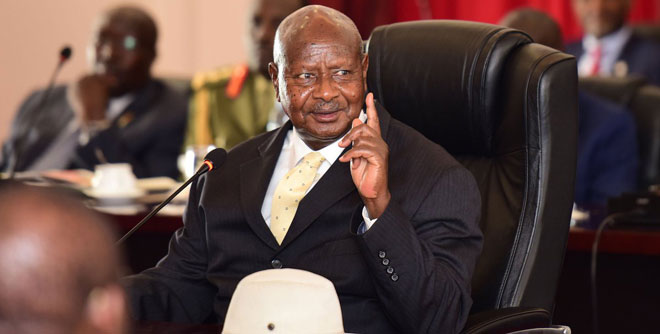
They pointed out that in the 2011 election, before Musisi came in, Museveni got 226,000 votes against his main challenger; Kizza Besigye’s 229,000 in the city; a difference of about 3,000 votes. In the same elections, NRM won three parliamentary seats in Kampala against the combined opposition which won six seats. In fact, they said, most NRM candidates had been competitive in Kampala, only losing narrowly.
In 2016, they said, Museveni and the NRM faced a total rout because of Musisi. Museveni’s votes, they pointed out fell by 30% to 157,000 while Besigye rose by more than 50% to 335,000. In short Besigye, who had a small lead of 3,000 votes, now garnered a staggering lead of 180,000 votes, more than double the total votes Museveni got in Kampala. Not a single candidate on the NRM ticket in Kampala was elected to parliament.
Museveni had laid the ground for this analysis when, while addressing a post-election retreat and his first media briefing at his country home in Rwakitura, he squarely blamed the loss in Kampala on Musisi. Before that, then-NRM Chairperson for Kampala Central Salim Uhuru had attributed the failure by the party’s flag bearers to win in the city to the mess at the party’s Electoral Commission. The NRM primaries for Mayor had been won by Daniel Kazibwe aka Ragga Dee; a renowned musician who failed to muster wide appeal.
Even before the 2016 election, Museveni had at his last campaign rally in Kampala, pushed Musisi under the NRM bus with an apology to residents of downtown Kampala about KCCA’s harsh way of delivering the much-needed change in the city.
Majority of the people in the crowd were hawkers, former street vendors, market vendors and petty traders as well as the unemployed. It was claimed these no longer supported Museveni and NRM because of Musisi’s approach to restoring order in the city.
City lawyer and former Kampala District Land Board (KDLB) chairman, Yusuf Nsibambi, recalls that event as the climax of effort to break Musisi’s back. He says it was the handwork of what he calls the “mafias” to drag down Musisi’s determination and hard work.
“The mafia group targeting to get tenders for works in the city undermined her role and would break the chains to get into the system,” he told the Independent in a recent interview.
He said from that point on Musisi could not act, even against petty street vendors or hawkers to completely clean off Kampala streets because these translate into votes for Museveni. Musisi and her team were damaged by the politics of populism from Museveni, he said.
Unwanted KCCA jobs
Soon after that, in November 2016, Musisi’s then- deputy, Judith Tukahirwa resigned citing political interference. She said she was quitting because of “failure of certain government agencies to assist KCCA fulfill its potential on account of the politics of the day”.
As morale collapsed and her team crumbled, Musisi appears to have resorted to operating purely as a technocrat. When Museveni renewed her contract in April 2017, it was a decision not backed by the trend. As Museveni blamed her for his political failures, Musisi equally had been sending signals that she no longer wanted the job.
“Had I known what this job involves at the time the President asked me to take it up, I would have declined,” she had said on February 28, 2017 while appearing before the Parliamentary Committee on Statutory Authority and State Enterprises (COSASE).
In her 21-page resignation letter, which she made public, Musisi cited lack of support from Museveni indirectly.
“There is inadequate political support to the efforts of the KCCA technical team to transform Kampala and therefore many planned city improvement plans have not been implemented,” the letter reads in part.
“I have over the last seven years raised these issues numerous time to the executive and legislature which have at times made some efforts to address them. However, on the whole these challenges have not been substantially addressed therefore hampering planned transformation programmes and expected service delivery”.
So, in her last days, it was difficult to imagine Musisi as someone who had earlier viewed her role to include a political mission to frustrate the opposition. Back then, the target of her attack was Lord Mayor Lukwago who she effectively locked out of office.
The crest of Musisi’s campaign against Lukwago was in November 2013 and it was ugly. Musisi joined then Minister for Kampala, Frank Tumwebaze to oversee an impeachment attempt on Lukwago. There was drama in the White Hall chamber when Lukwago supporters attempted to table a court injunction of the proceedings and were violently blocked by security personnel. A lawyer acting on Lukwago’s behalf was also dragged on the tarmac of city streets and his suit torn to tatters. Lukwago’s office was barricaded.
 The Independent Uganda: You get the Truth we Pay the Price
The Independent Uganda: You get the Truth we Pay the Price



Too much hoolabaloo has been made another the death of KASHOGI am beginning to believe that KASHOGI was more than a journalist the western media want us to believe.
Many journalists have been imprisoned killed maimed without such an unpropotianal outcry
…the question must be WHO WAS KASHOGI?